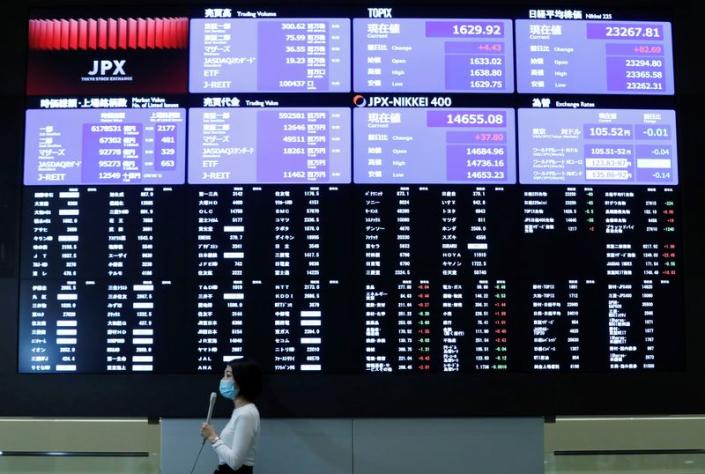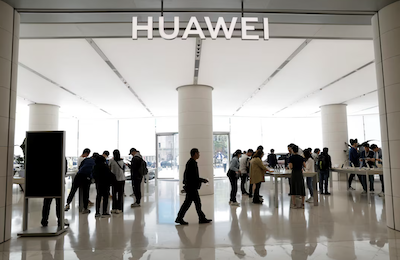Asian stocks saw a mixed start to the week ahead of what could be a make-or-break few days for US interest rates and amid more downbeat data out of China.
Investor mood for the rest of May will depend on whether the US April inflation report shows evidence of cooling after three months of upside surprises, while figures revealing China’s credit growth hit a record low in April further dented hopes of a turnaround for the world’s No2 economy.
Japanese shares ended lower as investors grew cautious ahead of corporate earnings reports, while rising Japanese government bond yields weighed on sentiment.
Also on AF: AI Can’t Be Trusted to Set Interest Rates – Yet: Bank Chief
The Nikkei inched down 0.13% to close at 38,179.46, after slipping below the 38,000 level for the first time since May 2 earlier in the session. The broader Topix was down 0.15% to 2,724.08.
The real estate sector lost 3.26% to become the worst performer among the Tokyo Stock Exchange’s 33 industry sub-indexes.
Earlier in the session, the Bank of Japan cut the amount of Japanese government bonds it offered to buy in a regular purchase operation, sending Japanese government bond yields higher.
China stocks edged back as the issuance of $138 billion of long-term stimulus bonds offset weak data that showed the country’s credit growth slumped last month, while Hong Kong shares tracked regional markets higher.
New bank lending in China fell more than expected in April from the previous month, while broad credit growth hit a record low, the central bank said on Saturday, raising the prospect of more action to support the economy.
Also denting sentiment, Chinese new energy vehicles fell 1.8% after it was reported that US President Joe Biden is set to announce new China tariffs as soon as this week targeting strategic sectors, including a major hike in levies on electric vehicles (EVs), sources said.
China’s blue-chip CSI300 index inched down 0.04% while, earlier in the session, its financial sector sub-index was lower by 0.02%, the consumer staples sector down 1.54%, the real estate index down 1.31% and the healthcare sub-index up 0.18%.
The Shanghai Composite Index dropped 0.21%, or 6.53 points, to 3,148.02, while the Shenzhen Composite Index on China’s second exchange fell 0.95%, or 16.98 points, to 1,766.79.
Chinese H-shares listed in Hong Kong – stocks belonging to companies from the Chinese mainland – rose 0.39% to 6,745.09, while the Hang Seng Index gained 0.80%, or 151.38 points, to close at 19,115.06.
Elsewhere across the region, in earlier trade, Singapore, Taipei, Mumbai, Manila and Jakarta were all higher, while Sydney and Seoul were flat. Wellington and Bangkok fell.
MSCI’s broadest index of Asia-Pacific shares outside Japan edged up 0.1%, after rallying for three weeks straight.
Dollar Holds Against Yen
Also due out his week are figures on US producer prices, retail sales and jobless claims, along with final reports on European inflation that should reinforce expectations for a June rate cut from the European Central Bank.
Eurostoxx 50 futures added 0.1%, while FTSE futures dipped 0.2%. S&P 500 futures and Nasdaq futures were both up around 0.1%, after rallying last week as company earnings came in strong.
With 80% of the S&P 500 having reported results, companies are on track to have increased earnings by 7.8%, well ahead of the April expectation of 5.1%.
Once Nvidia reports on May 22, quarterly earnings from so-called Magnificent Seven firms are on track to jump 49%, according to Tajinder Dhillon, senior research analyst at LSEG.
Global share indices have also bounced to record highs in recent weeks, even as markets scale back some of their more aggressive wagers for rate cuts this year.
The relative outperformance of the US economy continues to underpin the dollar, while only the threat of Japanese intervention is stopping it from re-testing the 160 yen barrier.
The dollar was holding at 155.82 yen, while the euro was flat at $1.0770 having faced resistance around $1.0791 last week.
Gold eased a touch to $2,355 an ounce, after rising 2.5% last week on demand from momentum funds and talk of persistent buying by China.
Oil prices faded late last week as US gasoline and distillate inventories rose ahead of the start of the summer driving season. Brent was down another 22 cents at $82.57 a barrel, while US crude dipped 17 cents to $78.09 per barrel.
Key figures
Tokyo – Nikkei 225 < DOWN 0.13% at 38,179.46 (close)
Hong Kong – Hang Seng Index > UP 0.80% at 19,115.06 (close)
Shanghai – Composite < DOWN 0.21% at 3,148.02 (close)
London – FTSE 100 < DOWN 0.02% at 8,432.20 (0920 BST)
New York – Dow > UP 0.32% at 39,512.84 (Friday close)
- Reuters with additional editing by Sean O’Meara
Read more:
Foreign Direct Investment in China Plunges 56% in Q1: Nikkei
US Tariffs Loom on Chinese EVs, And Maybe Solar Panels
Shein Looking to File For IPO in London as US Plans in Limbo
Energy Shares Lift Hang Seng; New US Sanctions Trip China Stocks
























